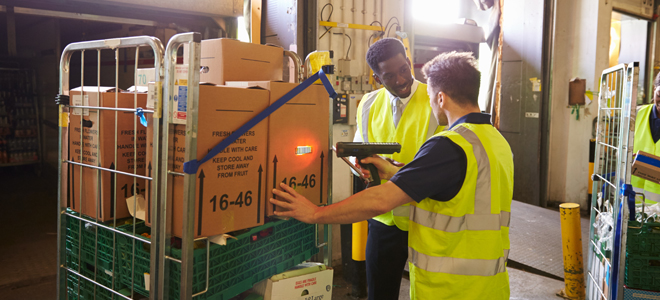September 14, 2018 Opinion piece
With the 90th edition of the Academy Awards taking place in Hollywood, most eyes were on the main awards – Best Picture, Best Actor in a Leading Role and Best Actress in a Leading Role.
The Shape of Water stole the show winning four awards (including Best Picture) while Dunkirk (three wins) and Three Billboards Outside Ebbing, Missouri (two Oscars) also fared well. However, away from the main prizes, something the Academy Awards does well is recognise that there is far more that goes into a fantastic film than star turns from the stellar performers. Its 24 categories acknowledge excellence in areas as varied as sound mixing, makeup and hairstyling and visual effects, recognising that there are many constituent parts that make up a successful production.

With the retail experience, it can be easy to focus on the main stage and forget the work that goes on behind the scenes. We all have our favourite stores (the films) and the shop assistant may well be your leading man or lady (particularly if there is a further discount applied to your must-have purchase at the point of sale) – or the social media staffer who smoothly handles your complaint/return if you’re buying online – but what of the unsung heroes who prepare your goods for delivery? Or find them in the warehouse in the first place to make sure your local store has them in stock? In this respect, logistics, transport and warehousing are the production team that make everything happen, even if their names might be found further down the credits.

We recently launched productDNA, a catalogue of high quality, independently verified product data and images to make life easier for retailers, brands and suppliers to share information. While the main intention is to improve the process for the whole supply chain such as giving retailers easy access to product data to help them save time and money – not to mention enhancing the retail experience for shoppers through seamless product comparison due to universal information – there are many benefits for those at the logistical back-end.

We are confident that the new service will have many advantages across the board – particularly in terms of the introduction of new products or tweaked versions of existing ones – but while innovation and launches capture the headlines, keeping the cogs turning in the background is just as important. After all, for all the effort and ingenuity that FMCG suppliers are putting into streamlining sales and operations planning and forecasting, major opportunities remain in the outbound supply chain, from packaging to final delivery.
Suppliers are under immense pressure from grocery retailers and high street stores to lower costs, so any cost savings that can be made are bound to be well received. Up to half the cost of many supply chains lurks in outbound logistics and behind the closed doors of distribution centres. Much of that cost can be eliminated by improving product data management.

FMCG logistics represent about 7.5% of sales (2.5% in warehousing, and 3.5% in transport with another 1.5% elsewhere in the chain), much more than what we find in other industries such as pharma (2%) or high-tech (5.5%). In transport, accurate information on the size and weight of products means vehicles can be loaded more efficiently, which helps shrink the total number of lorries in transit at any one time. Shipment size is one of three real drivers that have a disproportionate effect on transportation costs.
Case sizes can change by 20% each year – often shrinking to meet the needs of the convenience market – and yet, often, the data isn’t updated in the systems. Load planning therefore becomes less accurate. Poor quality ‘cage filling’ or ‘cube filling’ essentially means a lot of air is getting shipped across the UK. As a workaround, fill calculations allowing 110% oversize are often used within the industry. Of course, sometimes that leads to there being no space for all the products. When there is, inevitably, not enough space for a delivery, the extra goods have to be put on expensive ‘milk runs’ at great cost.
Accurate information minimises the need for additional data checks and data corrections, which in turn positively affects the speed of product flows within the network. The vast majority of shipments weigh less than five kilos, but these small shipments cost around six times as much per kilogram as larger shipments. Even where companies do manage to consolidate deliveries into larger shipments, it usually fails to capture all the available savings; by weight, a quarter of product is shipped in the lowest cost bracket, but nearly half fell into the next price bracket up. And inaccurate weight information increases the risk of overloading trucks, which can lead to fines.

In the UK, two-fifths of invoices do not match with what actually arrives, causing delivery rejection, manual investigations, repeat journeys and wasted effort on behalf of suppliers; not to mention their customers. Accurate invoice information improves order accuracy, limiting the risk of shipment rejection. And shipping rejection can lead to special delivery services to fix the problem – express shipping guaranteed by 10am the next day can cost up to five times more than conventional 24-hour delivery.
Additional benefits could be achieved by increasing productivity and by lowering “out-of-stock” levels. Accurate data and labelling eliminate the necessity for additional checks and re-measuring of products, leading to higher productivity among warehouse staff.
Many warehousing operations are not working as efficiently as they could – and not because the warehouses lack technology; rather it is the cumulative effect of dozens of slightly sub-optimal processes. A few fundamental changes in the way they make use of better product data could immediately close large gaps between current performance and the benchmark. The solution to these transport and warehousing woes is better product data and information.
There are real and achievable efficiencies to be made here. In the US, suppliers using an improved data solution achieved 2-8% annual cost savings in terms of inbound and outbound operations. An IBM report investigating global impact of data sharing solutions reported a 3% increase in on-time deliveries between 2006 and 2010 and indicated a drop of 6% in distribution costs between 2006 and 2010. Of course, inefficient or unreliable warehouse operations and transportation cost more than money—delivery delays can do quick and lasting damage to a company’s reputation with customers.
And companies that have excellent product data not only save money in warehouse operations but enjoy more flexibility and better service. With margins under pressure, developing utilising product data within warehouse operations can dramatically reduce costs. Even more important, it serves as a powerful value proposition to customers in a market where providers can struggle to differentiate their offerings.
Sometimes the assumption can exist that an industry or way of working is beyond reproach due to how successful or lucrative it is, but there is always room for improvement. The #MeToo movement that started in Autumn last year and has since gone viral showed that, what to many outsiders looked like the most glamorous industry of all, Hollywood, was beset by ethical problems dating back decades, something cited in Frances McDormand’s powerful acceptance speech on Sunday. Similarly, many of us rarely encounter problems shopping, so wrongly assume that the current system is working to the best of its ability. But scratch below the surface – and witness high profile supply chain cock-ups like the recent KFC debacle – and it becomes apparent that even blue-chip brands are only one new supplier away from disaster. We don’t expect productDNA to dominate the celeb columns, but improving life behind the scenes and landing plaudits from those in the know certainly deserves a spot on the red carpet.
![]() www.linkedin.com/gary-lynch
www.linkedin.com/gary-lynch
![]() @gary_gs1uk
@gary_gs1uk